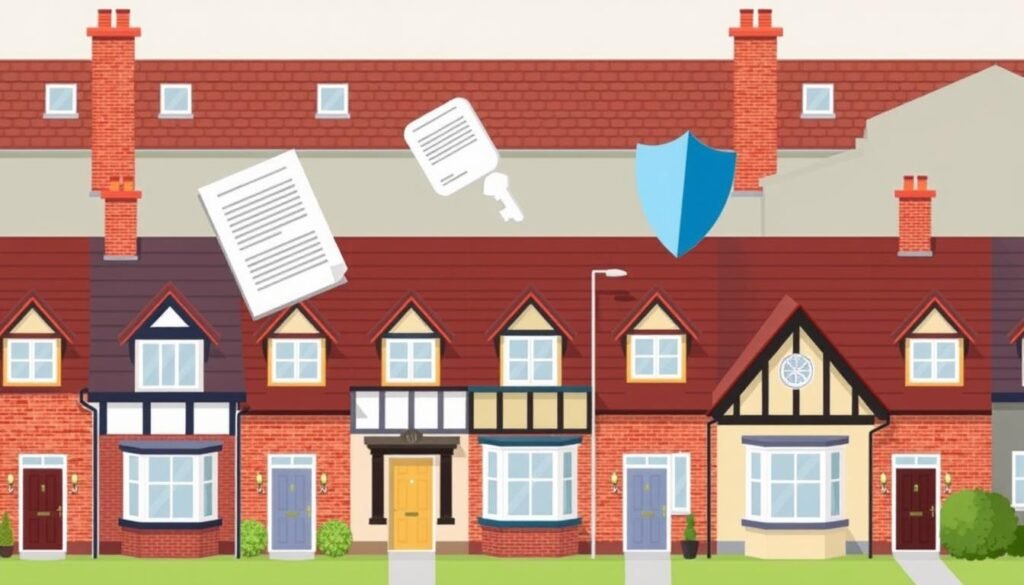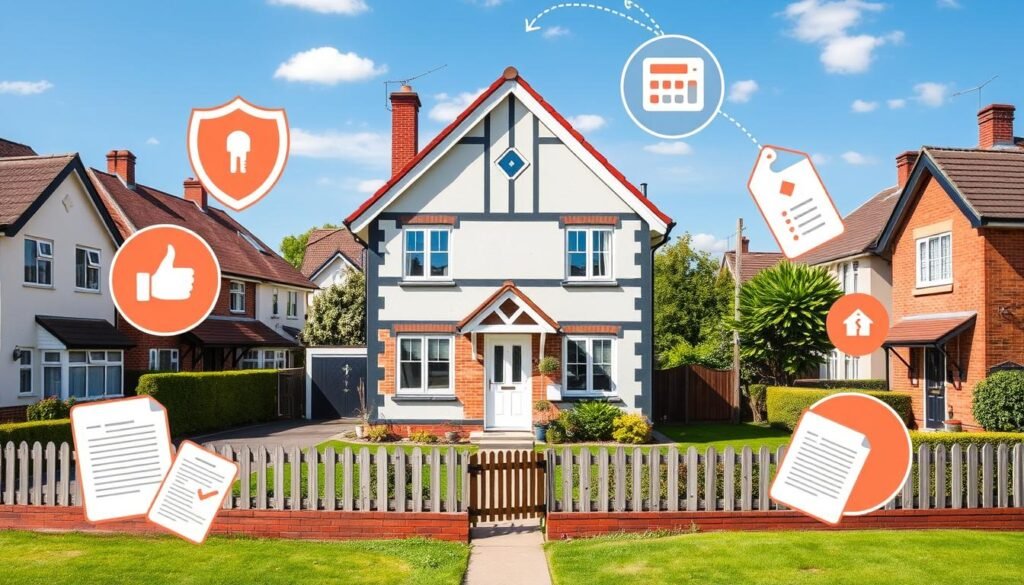Are you risking your investment by not having proper landlord insurance? As a property owner, it’s vital to protect your rental asset. A good landlord insurance policy gives you rental property protection. It keeps you safe from financial risks.
Landlord insurance is different from regular home insurance. It covers risks linked to renting out your property. It’s not just about protecting your home; it’s about keeping your income safe and covering unexpected costs. A landlord insurance policy can protect you from damage to your property and legal issues.
Even though it’s not a must-have, many mortgage lenders ask for landlord insurance for buy-to-let properties. This type of insurance can cover loss of rent, property owners’ liability, and legal costs. With over 100,000 UK landlord policies in place and a 9/10 customer satisfaction rate, it’s clear many property owners see the importance of this protection.
Key Takeaways
- Landlord insurance is often required by mortgage providers for buy-to-let properties
- It covers risks not included in standard home insurance policies
- Protection extends to property damage, liability claims, and loss of rental income
- Over 100,000 UK landlords trust in these policies
- Claims are handled by award-winning teams, ensuring prompt and efficient service
Am I legally required to get landlord insurance?
Landlord insurance is not a must-have in the UK. Yet, it’s key for those who rent out properties. It’s not the law, but it’s important for protecting your investment and meeting your duties as a landlord.

Most lenders for buy-to-let mortgages want you to have insurance before they say yes. This is because rental properties come with special risks. Regular home insurance won’t cover rental issues, leaving landlords at risk of big losses.
Landlord insurance, also known as property owners insurance, covers many risks. These include damage by tenants, liability claims, and losing rent money. A recent survey found 14% of landlords don’t have this insurance, which could be risky for their properties.
Even though it’s not the law, getting landlord insurance is a smart move. It gives you the right kind of protection for rental properties. Here are some important facts:
- 43.5% of landlord insurance claims were for ‘escape of water’ incidents
- The average repair cost for burst pipes in the cold is £8,800
- Storm damage claims can go up to £93,020
In summary, landlord insurance is not a legal must but a smart choice for property owners. It gives you full protection and peace of mind. This way, you can handle your landlord duties well.
What is landlord insurance and do I need it for my property?
Landlord insurance is a special kind of insurance for those who rent out their homes. It gives property owners extra protection that standard home insurance doesn’t offer.
Definition of landlord insurance
This insurance covers property owners against risks of renting out their homes. It includes insurance for the building, contents, and liability. It’s vital for landlords because regular home insurance often doesn’t cover rental activities.
Key components of landlord insurance policies
A good landlord insurance policy has several important parts:
- Buildings insurance
- Contents insurance for furnished properties
- Property owners’ liability cover
- Loss of rent protection
- Legal expenses coverage

Legal requirements and mortgage lender expectations
In the UK, landlord insurance isn’t a must-have, but many mortgage lenders want it for buy-to-let properties. Remember, landlord legal protection is often part of comprehensive policies. It helps cover legal costs for tenant disputes or property damage.
| Policy Feature | Description | Average Cost |
|---|---|---|
| Basic Landlord Insurance | Covers buildings, liability, and loss of rent | £150/year |
| Comprehensive Cover | Includes additional features like legal expenses and malicious damage | £200-£300/year |
| Multi-property Cover | Covers up to 15 properties under one policy | Varies based on properties |
Landlords should think about their specific needs and risks when choosing coverage. Policies start at £15 a month. Landlord insurance is key to protecting your rental property investment.
Types of Cover Included in Landlord Insurance
Landlord insurance gives property owners full protection. It includes various covers suited for rental properties. Let’s look at the main parts of a landlord insurance policy.
Buildings Insurance for Rental Properties
Landlord building insurance is key. It protects your property’s structure and permanent fixtures against risks like fire, flood, and storms. This cover helps you avoid expensive repairs from unexpected events.
Landlord Contents Insurance
If you rent out furnished properties, you need landlord contents insurance. It covers things like furniture, appliances, and other items you give to tenants. This ensures your property’s contents are safe.
Property Owners’ Liability Cover
Property owners liability insurance is crucial for landlords. It covers you if someone gets hurt on your property. Policies usually offer between £2 million and £5 million in cover, keeping you safe from legal costs and damages.
Loss of Rent Protection
Rent guarantee insurance is a big help for landlords. It pays you if your property can’t be lived in because of an insured event. Some policies even cover unpaid rent, up to eight months under certain conditions.
| Cover Type | Protection Offered | Typical Limits |
|---|---|---|
| Buildings Insurance | Structure and fixtures | Rebuild cost of property |
| Contents Insurance | Furnishings and appliances | Sum insured value |
| Liability Cover | Compensation claims | £2 million – £5 million |
| Rent Guarantee | Lost rental income | Up to £2,500 per month |
With over 100,000 UK landlord policies and a 9/10 customer rating, comprehensive landlord insurance is a smart choice. The award-winning claims team offers top support when you need it.
Additional Landlord Insurance Options
Landlords can get extra insurance to protect themselves more. These policies cover risks unique to UK rental properties.
Landlord legal expenses insurance is key. It helps with legal costs from tenant disputes or evictions. It keeps landlords safe from big legal bills. This goes well with tenant default insurance, which covers lost rent if tenants don’t pay.
Landlord emergency cover is great for urgent issues. It helps with things like boiler or plumbing problems, fixing them fast to keep tenants happy.
Unoccupied property insurance is a must when your property is empty. It protects against damage from vandalism or the weather. This is very important during times when there are no tenants or when you’re doing up the property.
| Insurance Type | Coverage | Typical Cost |
|---|---|---|
| Legal Expenses | Legal costs, eviction proceedings | £50-£75 per year |
| Emergency Cover | 24/7 assistance for urgent issues | £60-£100 per year |
| Unoccupied Property | Protection during void periods | 1.5-2 times standard premium |
| Tenant Default | Covers missed rent payments | £150-£250 per year |
Choosing these extra options lets landlords make a full insurance package. It fits their needs and risk level, giving them peace of mind with their property.
Factors to Consider When Choosing Landlord Insurance
Choosing the right landlord insurance is important. You need to think about several key factors. These can affect your insurance costs and how well your property is protected.
Property Type and Location
The type of property you own is key to your insurance needs. Houses, flats, and Houses in Multiple Occupation (HMOs) each have different risks. For example, HMOs with more than three non-family tenants need special insurance and a council license.
Tenant Demographics
Your tenants’ profile can change your insurance costs. Professional tenants are usually seen as lower risk, so they cost less. But, student tenants might make your insurance more expensive because they’re seen as a higher risk of damage.
Level of Furnishing
The amount of furniture in your property affects your insurance needs. Properties fully furnished need more coverage than those that aren’t.
Risk Assessment and Coverage Needs
It’s important to assess risks for the right coverage. Think about areas prone to floods or high-crime spots. Remember, landlord insurance is about 15% more expensive than homeowners insurance.
| Coverage Type | Options | Notes |
|---|---|---|
| Property Owners’ Liability | £1 million, £2 million, £5 million | Choose based on risk assessment |
| Loss of Rent Indemnity | 12, 24, 36 months | Covers rent while property is repaired |
| Additional Cover | Accidental damage, Pet damage, Rent guarantee | Optional extras for comprehensive protection |
Changes in who lives in your property or changes to it can affect your landlord insurance claims. Always tell your insurer about these changes to keep your insurance valid and protect your property well.
Conclusion
Landlord insurance is key for property owners in the UK’s fast-paced rental market. It’s not a must-have, but it’s vital for protection against risks like damage, liability claims, and income loss. These policies can be adjusted to fit your needs, giving full protection to your landlord property.
The price and what’s covered in landlord insurance depend on several things. Properties in areas at high risk, like those often hit by natural disasters or with lots of crime, might cost more. The type of tenants, how big the property is, and extra coverage options also affect the price. For example, having students as tenants might make premiums go up, but having professional tenants could lower them.
Landlords can get more protection with extra features like home emergency insurance, which is about £112 per property. With a top service rating of 4.6/5 from 4,451 reviews, landlord insurance shows its value in the UK property market. By looking at their specific needs and risks, landlords can get full coverage. This ensures their investment stays safe in the unpredictable world of property letting.




